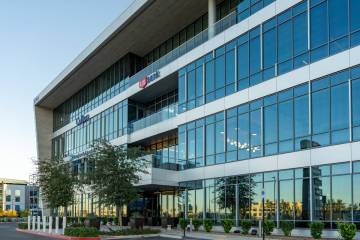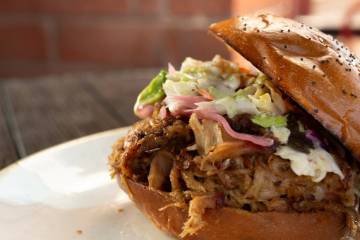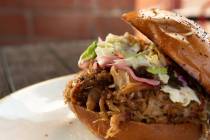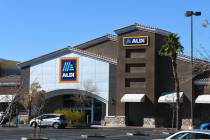When Nevada drivers’ cars fail on freeway, service patrolman comes riding to rescue
Rear-ending another driver proved the best career move Jason Caudill ever made.
En route to a job interview for a security post inside a Strip casino, Caudill slammed into the back of a car on U.S. Highway 95 near Jones Boulevard. But Caudill's rotten day took a turn for the better when a patrolman with the Nevada Department of Transportation's Freeway Service Patrol pulled over to help. The patrolman quickly spotted potential in Caudill and hooked him up with a job interview with the service's private operator, Massachusetts-based Samaritania.
Today, three years after he joined the service, Caudill supervises the 12-person patrol, which has six vans trolling local highways between 6 a.m. and 7 p.m., aiding broken-down drivers free of charge, removing debris from travel lanes, assisting on accident scenes and even rescuing stray animals.
Question: How did you go from accident victim to job candidate?
Answer: Within about five or 10 minutes, one of our guys stopped by the accident. At the time, I had no idea what the Freeway Service Patrol was. He got into a conversation with me. I mentioned I was on my way to an interview, and I was a little frustrated because it was something I was overqualified for, and he asked me what I was qualified for. So I started listing it off -- emergency medical technician, firefighter -- and the guy tells me, "You know, we have three positions open." He got on the phone right away, dialed up the owner of the company and said, "I have someone you need to talk to right now." I was talking to him while I'm on the scene of the accident, and he said, "I'm going to come out next week and we'll do an interview." He flew out from Boston, and the next week I had a job.
Question: How much extra training did you need beyond your EMT skills?
Answer: We are qualified to do so much. People think we just change tires and give gasoline, but we're also mechanics, EMTs, firefighters, animal control officers and traffic safety officers.
Before I started, I had a basic knowledge of how to change tires, belts and hoses just from working on my own personal vehicle. I've also done a lot of training, going through community college to become (Automotive Service Excellence)-certified. A lot of problems are really common, and I can key in really quickly, get the problem fixed and get them out of there.
We start out with our two-week training. We have a supervisor sitting in the passenger seat analyzing everything we do. We have to drive a specific speed limit, we have to pull over at certain odd times. Basically, we want to be the role model for the community as far as drivers go -- courteous all the time, driving in a safe manner.
Question: Do drivers glare at you when you're puttering along at 65 miles per hour?
Answer: Actually, it's 55. At 55 miles per hour, we get a lot of friendly hand gestures, but it's OK.
Question: What kind of attitude does someone need to handle that?
Answer: You have to have unconditional positive regard for all.
Question: How hard is it to hold that regard all the time?
Answer: Honestly, it takes the right person. We carefully select whom we hire. We give everyone a trial run before we decide they've made the cut. They have to remember that people who get into these situations are just frustrated and upset. They don't want to be there, and they feel like everything is going bad for them. We have to be completely empathetic.
Question: How often do you come across a situation you couldn't fix?
Answer: Occasionally. We always go that extra mile. If we have to take someone off the road, we'll take them home and tell them they can come back later and get the car. I get people in rental cars that break down on the way to the airport, and I'll take them to the airport. We'll call people tow trucks.
Question: What would be the limit on the type of situation you can handle?
Answer: You'd be surprised. There are a lot of quick, temporary fixes that are enough to get you to a shop where it can be worked on. We do what we can with what we have. A lot of the time, it's just temporary fixes, but some can be permanent, and the same kind of quality work you can get at any shop.
Question: Talk about some of the more unusual experiences you've had on the road.
Answer: The interesting thing to me, because of my firefighting background, is putting out vehicle fires. I've put out car fires and trailer fires. I actually chased a trash truck up (Interstate 15) north toward the Las Vegas Motor Speedway. Something inside caught on fire, and the truck was dropping flaming trash. I was following it and stopping every quarter of a mile or so to put out brush fires as it drove to the waste facility.
Another time, I came across a German shepherd in the roadway. He had been hit, and nobody wanted to touch him, because he was scared and trying to bite people. I love animals, so I just walked over, scooped him up and drove him to the nearest animal hospital. They asked who was going to pay for it. I called my boss, who's also an animal lover, and he told me to give them the company credit card. The dog made a full recovery, and we adopted him out.
Question: You started out as a service patrolman. How did you work your way up to supervisor?
Answer: A lot of hours and a lot of hard work. I just kept volunteering for things and doing the right things. We have a little competition for the group in Las Vegas, where we see who receives the most letters from motorists. In my first year, I had the most motorist letters. In my second year, I received the most comment cards.
Question: What did you do to make people write more?
Answer: I just like talking. I relate to people very quickly. I can step into a situation and find some kind of common ground with somebody almost instantly.
Question: How do you measure success?
Answer: If I feel as if I've done everything I can to help every person that I've stopped to assist, that day is a success for me. What little we may have done could have been the biggest thing in the world to the person we were helping.
Question: What are your future goals?
Answer: I'd like to open up any one of the other markets we're working on, to be first person there and set up personnel as far as interviewing and hiring and training. I'd like to start something I built and I helped contribute to. I want to show I'm valuable and dependable, and I want to help this company grow.
Question: What other markets are you looking at expanding to?
Answer: About four or five months ago, we had visitors from Dubai. We had a great time, laughing and talking about the things they were looking for. They've called every other week since, and they're very interested in having our service over there. Their visit was sparked by a 200-car pileup in heavy fog in a remote location. We'd be there, wading through the chaos to make some sense out of it and do what we could.
Contact reporter Jennifer Robison at jrobison@reviewjournal.com or 702-380-4512.
VITAL STATISTICS Name: Jason Caudill Age: 31 Position: Supervisor, Freeway Service Patrol Family: Wife, Stacey Education: Studying business at the College of Southern Nevada and the University of Nevada, Las Vegas; studied psychology at Golden Seal Community College in Huntington Beach, Calif. Work history: Infantryman, U.S. Marine Corps, stationed in the South Pacific and the Middle East; video store manager; moving company truck driver; anesthesia technician, Sunrise and Desert Springs hospitals; driver and service person, Freeway Service Patrol; supervisor, Freeway Service Patrol Hobbies: Playing sports, especially football; playing poker with friends; barbecuing at home for friends Favorite book: "The Fountainhead," by Ayn Rand Hometown: Hollywood, Calif. In Las Vegas since: 1984 Quotable: "We always go that extra mile. If we have to take someone off the road, we'll take them home and tell them they can come back later and get the car."

















